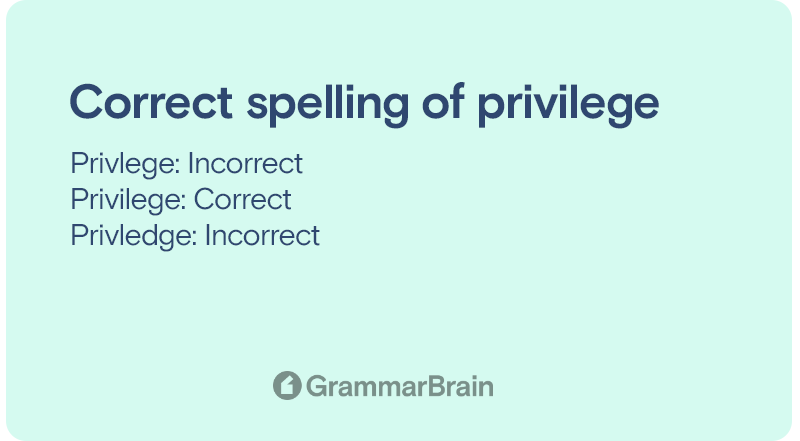Is it privledge or privilege or privlege? Privilege is a common word we use to describe special benefits. When it comes to spelling many of us spell it as “privledge.” But “privledge” is the incorrect or wrong spelling of privilege. There is no “G” in the spelling of privilege.
In this article, we’re going to learn more about the word privledge or privlege and some examples of using the word privilege.

Privledge, Privlege or Privilege: Meaning of Privilege
Privilege – this word means to have some advantage over other people, it means to be above everyone by at least one step in society. This means that you, as a privileged person, feel superior to everyone else, you are much better off in this crazy world, and you can count on something more than the rest of the mass of people who do not have any auxiliary maneuvers. Privilege allows you to live in a unique way, to have some special relationship with yourself.
The pronunciation causes it to be misspelled. In English, a word called “ledge” refers to something entirely different. However, when spoken, the lege suffix in the word privilege sounds like a ledge.
Other terms, like knowledge, have the same sound and a second “d” added to their spelling, while privilege does not. The spelling does not accommodate the letter d.
An advantage received by a person or group that is not available to others is a privilege. The word privilege is derived from the Latin word “privilegium,” which means law for just one person. Someone with riches is privileged. Borrowing rights are available to everyone with a library card. The word privilege can also be a verb.
“Privledge” in English Grammar:
The term privilege should not be spelled as a privilege. It has no significance. Grammar-wise, the word is incorrect in English. The “d” in privilege should be a “c.” The original meaningful term lacks the letter.
A “ledge” is a word that exists in English. Additionally, it appears that the spelling will be Privilege based on how the word is pronounced.
Examples of Using the Word Privilege:
Because Sara enjoys the college privilege, She is not one of us.
Caty had the privilege of meeting the President as his father was rich.
People who have specific privileges frequently have it easier than others.
Academic privileges that aren’t available to other students may be given to students at prestigious universities.
Josh had the privilege to go to the temple as his father is the head priest.
Amir received that privilege as his father is a minister.
They are privileged to be a member of the Peter family.
I’m taking a big chance by giving you this privilege.
What are the Other Words for Privilege?
A privilege is an advantage that is awarded to a specific individual or group. a unique privilege or benefit that is granted to a certain person or group of persons and not to everyone else. The synonyms of privilege are:
- Benefit
- Advantage
- Concession
- Right
- Liberty
- Entitlement
What is the Plural Form of the Word Privilege?
The plural of privilege can be either “privilege” or “privileges” depending on whether the word is countable or uncountable.
When discussing a privilege that many people enjoy, such as “white privilege,” the word “privilege” is used in the plural.
When discussing a countable number of distinct privileges, the word “privileges” is used in the plural.
You should be grateful for your many privileges because they make life possible.
In review
A privilege is a special advantage or power granted to a specific individual or group. If you are thinking of which is the correct word “Privilege” or “Priviledge”, then you must know that Privilege is spelled incorrectly. It should be Privilege.
FAQs
What is the correct spelling of privilege?
It should be remembered that in the dictionary word “privilege” is written without “d”. So, in the correct spelling of the word privilege is not priviledge.
What is the meaning of privilege?
“Privilege” is an advantage that a person or group of them has over others and/or groups that have not been earned in some way.
Who are the privileged people?
The privileged groups have power over the oppressed. The privileged are more likely to occupy positions of power. For example, they are much more likely to dominate the political arena, are often economically wealthy, have influence in the media, and hold leadership positions in companies.
Inside this article
Fact checked:
Content is rigorously reviewed by a team of qualified and experienced fact checkers. Fact checkers review articles for factual accuracy, relevance, and timeliness. Learn more.
Core lessons
Glossary
- Abstract Noun
- Accusative Case
- Anecdote
- Antonym
- Active Sentence
- Adverb
- Adjective
- Allegory
- Alliteration
- Adjective Clause
- Adjective Phrase
- Ampersand
- Anastrophe
- Adverbial Clause
- Appositive Phrase
- Clause
- Compound Adjective
- Complex Sentence
- Compound Words
- Compound Predicate
- Common Noun
- Comparative Adjective
- Comparative and Superlative
- Compound Noun
- Compound Subject
- Compound Sentence
- Copular Verb
- Collective Noun
- Colloquialism
- Conciseness
- Consonance
- Conditional
- Concrete Noun
- Conjunction
- Conjugation
- Conditional Sentence
- Comma Splice
- Correlative Conjunction
- Coordinating Conjunction
- Coordinate Adjective
- Cumulative Adjective
- Dative Case
- Determiner
- Declarative Sentence
- Declarative Statement
- Direct Object Pronoun
- Direct Object
- Diction
- Diphthong
- Dangling Modifier
- Demonstrative Pronoun
- Demonstrative Adjective
- Direct Characterization
- Definite Article
- Doublespeak
- False Dilemma Fallacy
- Future Perfect Progressive
- Future Simple
- Future Perfect Continuous
- Future Perfect
- First Conditional
- Irregular Adjective
- Irregular Verb
- Imperative Sentence
- Indefinite Article
- Intransitive Verb
- Introductory Phrase
- Indefinite Pronoun
- Indirect Characterization
- Interrogative Sentence
- Intensive Pronoun
- Inanimate Object
- Indefinite Tense
- Infinitive Phrase
- Interjection
- Intensifier
- Infinitive
- Indicative Mood
- Participle
- Parallelism
- Prepositional Phrase
- Past Simple Tense
- Past Continuous Tense
- Past Perfect Tense
- Past Progressive Tense
- Present Simple Tense
- Present Perfect Tense
- Personal Pronoun
- Personification
- Persuasive Writing
- Parallel Structure
- Phrasal Verb
- Predicate Adjective
- Predicate Nominative
- Phonetic Language
- Plural Noun
- Punctuation
- Punctuation Marks
- Preposition
- Preposition of Place
- Parts of Speech
- Possessive Adjective
- Possessive Determiner
- Possessive Case
- Possessive Noun
- Proper Adjective
- Proper Noun
- Present Participle
- Prefix
- Predicate



